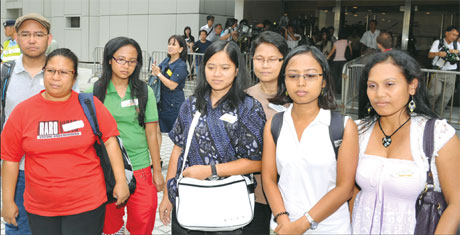Opening salvos fired in battle of right of abode
Updated: 2011-08-23 07:02
By Joseph Li(HK Edition)
|
|||||||
|
Filipina and Indonesian Migrant Workers' Union members leave the High Court, in support of Evangeline Banao Vallejos, a Filipina maid who has worked in Hong Kong since 1986, on Monday. Laurent Fievet / Agence France-Presse |
Two-day hearing to decide if maids have right to permanent residency in SAR
Foreign domestic helpers who have lived in Hong Kong for seven years or more should be entitled to the right of abode under terms of the Basic Law, a lawyer for the domestic workers told the opening of a judicial review on Monday.
Gladys Li argued that restrictions limiting the right of abode of foreign domestic helpers under the Immigration Ordinance are at variance with the Basic Law, and she called on the court to declare the restrictive provisions unconstitutional.
David Pannick, counsel for the government, however, argued that foreign domestic helpers should not be deemed to have "ordinarily resided in Hong Kong".
On that basis he argued the Immigration Ordinance is constitutional and the foreign domestic helpers are not entitled to the right of abode.
The controversial judicial review before Justice Johnson Lam of the Court of First Instance arises from a challenge of the Hong Kong government's rejection of applications for Hong Kong permanent residency.
Consideration has also been given to seeking an interpretation of the applicable articles of the Basic Law by the National People's Congress Standing Committee. Such an interpretation may be requested at any stage of the judicial proceeding.
The petitioner in the case is Evangeline Banao Vallejos, who first came to Hong Kong in 1986 and has been serving the same employer since 1987.
When she applied for a permanent resident identity card in 2008, her application was rejected.
She appealed before the Immigration Tribunal in 2010, but was once again rejected.
The tribunal at that time declared her ineligible under the law, sparking the current judicial review.
In her submission, Li said Vallejos had resided in Hong Kong for more than seven years, in line with Article 24(2)(4) of the Basic Law regarding persons not of Chinese nationality.
The meaning of the language of the article is plain, clear and does not carry any additional condition, Li submitted, and the additional restrictions imposed under the Immigration Ordinance are therefore unconstitutional.
Pannick, arguing for the government, said, the terms of residency of domestic helpers in Hong Kong are "out of the ordinary", given that their stay is subject to a number of conditions.
Among other things, the workers are subject to two-year employment contracts, are required to reside in the homes of their employers, are not allowed to bring in their spouses or children, and the employers are required to pay for the workers' passage from Hong Kong to their place of origin.
These control measures indicate Hong Kong is not their place of origin, he said, since they are designed to maintain links to their place of origin.
Pannick also referred to Article 154(2) of the Basic Law, noting that the Hong Kong government may impose immigration controls on entry, stay or departure of persons from foreign places.
The hearing is expected to conclude on Tuesday. It is uncertain when the judgment on the matter will be rendered.
joseph@chinadailyhk.com
China Daily
(HK Edition 08/23/2011 page1)
